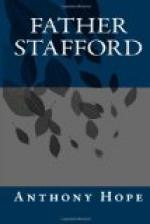When Stafford got into the train on his headlong flight from Millstead Manor, he had no settled idea of his destination, and he arrived in London without having made much progress toward a resolution. Not knowing what he wanted, he could not decide where he was most likely to find it. Did he want to forget or to think; to repent or to resolve? This is the alternative that presents itself to a mind puzzled to know whether its doubt is a concession to sin or a homage to reason. Stafford had been bred in a school widely different from that which treats all questions as open, and all to be referred to the verdict of the balance of expediency. Among other lessons, he had been taught a deep distrust of the instrument by which he was forced to guide his actions. But no training had succeeded in eradicating a strong mind’s instinct of self-confidence, and if up till now he had committed no rebellion, it was because his reason had been rather a voluntary and eager helper than a captive or slave to the tribunal he distinguished from it by the name of conscience. With some surprise at himself—a surprise that now took the place of shame—he recognized that he was not ready to take everything for granted, that he must know that what he was flying from was in fact sin, not only that it might be. That it was sin he fully believed, but he would be sure. So much triumph his passion extorted from him as he paced irresolutely up and down the square in front of Euston, after seeing Kate and Haddington safely away, while the porter and cabman wondered why the traveler seemed not sure where he wanted to go. Of their wonder and their irreverent suggestions he was supremely careless.
No, he would not go back at once to his active work. Not only did his health still forbid that—and, indeed, last night’s struggle seemed to him to have undone most of the good he had gained from the quiet of Millstead—but, what was more, he believed, above all, in the importance of the state of the pastor’s own soul, and was convinced that his work would be weak and futile done under such conditions; that in theological language, there would be no blessing on it. When he had once reached that conclusion, his path was plain before him. He would go to the Retreat. This word Retreat has become familiar to those who study ecclesiastical items in the paper. But the Retreat Stafford had in his mind was not quite of the common kind. It had been founded by one of the leaders of his party, and was intended to serve the function of a spiritual casual ward, whither those who were for the moment at a loss might resort and find refuge until they had time to turn round. It was not a permanent home for any one. After his stay, the visitor returned to the world if he would; if he were finally disabled he was passed on to a permanent residence of another kind. The Retreat was a temporary refuge only. Sometimes it was full, sometimes it was empty; save for the Superintendent, as he was




